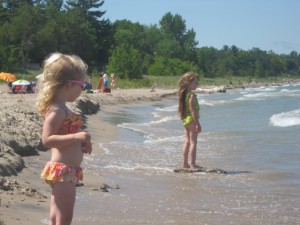
Positive parenting is hard. Why? Because you must be a conscious parent, always. Constantly. All day long. Every minute of every day. Even in the fuzzy gray of those groggy mornings after a night of restless co-sleeping–even when it’s late in the afternoon following a whirling day of no naps and fussy teething–and yes–even when it’s smack dab in the middle of bedtime and you are ready to go to bed much much more than the little one that you are struggling to soothe to sleep. You must be a conscious parent–a calm, gentle, thinking, and strategical parent, even then.
Positive parenting takes work, effort, time, energy, but most of all it takes brain power–lots of it–when you have it the least to give. As our 14 month-old son begins blossoming into a pre-toddler–that neitherland between infanthood and official toddlerhood at the age of two–we are beginning to consciously think about how we are going to handle the challenging behaviors that we know he is bound to exhibit. As we prepare by talking to other parents, reading books and articles, and attending parenting groups, our philosophy on how we are going to navigate through the wily world of throwing, kicking, biting, and tantrums is beginning to take shape.
Hitting, spanking, time outs, raised voices, and bribing with rewards are all routes we know that we do not wish to take. We know that these methods can result in a humiliated, embarrassed, isolated, externally rewarded, and defeated child and will not lead to the kinds of positive outcomes we are ultimately seeking–a confident, internally motivated, emotionally balanced, and secure child and teenager. And we know that it all starts now. We know that creating a child-friendly environment in our home is much healthier than constantly policing a home that has many things that cannot be touched, or that teaching empathy and giving tools to express frustration and anger early can curb a tantrum before it starts. We know that explaining to him now why he cannot do something is much more effective than overusing the scold “no”. Even at such a young age, we know that he is ready to learn from us and that anything but gentle conscious parenting during these challenging times will perhaps train, but not teach, him.
But during the long and fatigued days that are sure to be ahead, we also know that falling back on easier methods of parenting are just plain, well, easier–you don’t have to plan and think and explain. Using negative directives like “no” or “stop it” or “don’t do that” instead of explaining why or offering choices and alternatives obviously takes less effort and brain power. But at what expense? It will be hard to remember, always, that we will need to offer him the best of us so that he can fulfill his utmost potential–whatever he deems that to be. But we must.
Yes, it’s darn difficult raising a human, but, heck, whoever said it would be easy? And, we want a good human–a really good human.
Joni is an attached mom of one. She blogs over at her mommy blog, mama :: milieu, as well as, at her food website for families with hungry children, Feeding Little Foodies.




